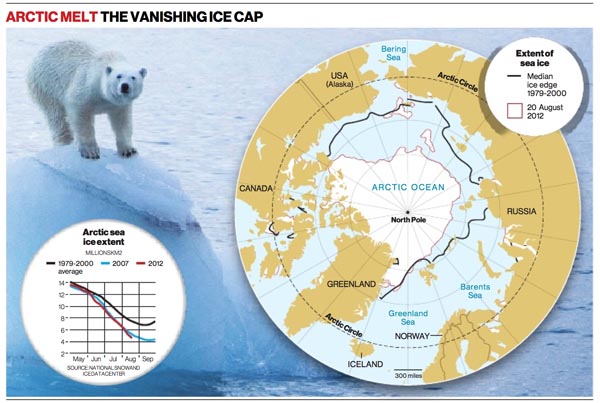The Arctic ice cap is melting at a startlingly rapid rate and
may shrink to its smallest-ever level within weeks -- and then
keep on melting.

Arctic ice melts next to the village of
Ny-Aalesundin, Norway in 2009. (AFP) The rapid ice
melt began much earlier than usual this year. Arctic ice melting
usually slows in August and then reaches its annual low point by
September. But 2012 is already set to see a lowest-ever melting
point by mid-August -- with no sign of the melting slowing.
"The numbers are coming in and we are looking at them with a
sense of amazement," said Mark Serreze, director of the National
Snow and Ice Data Center at the university. "If the melt were to
just suddenly stop today, we would be at the third lowest in the
satellite record. We've still got another two weeks of melt to
go, so I think we're very likely to set a new record."
Agence France Presse
reports:
The previous record was set in 2007 when
the ice cap shrunk to 4.25 million square kilometers (1.64
million square miles), stunning scientists who had not forecast
such a drastic melt so soon. Serreze said that the
extensive melt was in line with the effects of global warming,
with the ice being hit by a double whammy of rising temperatures
in the atmosphere and warmer oceans. "The ice now is so thin in
the spring just because of the general pattern of warming that
large parts of the pack ice just can't survive the summer melt
season anymore," he said. [...]
Serreze said it was possible that the
rapid melt was a factor in severe storms witnessed in recent
years in the United States and elsewhere as it changed the
nature of the planet's temperature gradients.
The planet has charted a slew of record
temperatures in recent years. In the continental United States,
July was the hottest ever recorded with temperatures 3.3 degrees
Fahrenheit (1.8 Celsius) higher than the average in the 20th
century, according to the National Oceanic and Atmospheric
Administration.
* * *

COMMENT:
This is a tragedy of gigantic proportions unfolding. Up
until about a month ago my understanding of the complex and
fragile ecosystem known as the Arctic was virtually nil.
It's still in the embryonic stages but I began to tackle
that ignorance by beginning my education with Barry Lopez's
Arctic Dreams. I wanted to understand more about the nuances
and subtleties that make up that region; understand it from
a writer known for his sensitivies and sensibilites about
nature, but who also augments his writing with scientific
facts. The Arctic ecosystem is mandatory for the survival of
millions of species of waterfowl, crestaceans and mammals.
Just the chapter on ice and light alone is filled with
wondrous and unimaginable details regarding the various
types of ice and the roles those different forms of ice play
regarding the survival of seals and polar bears, narwhals
and whales, and all the creatures big and small inbetween. I
never knew ice had such diversity to it. And not only that,
but it's taken millions of years for the species who depend
on that region to evolve and adapt to such harsh and
intricate conditions. To watch it unravel thanks to our
hubris and profit driven obsession is heart wrenching. The
Arctic is as worthy of our protection and concern as any
other complex ecosystem in the world.
I'm about to repeat myself, again, but the balancing act
between holding the unbearable grief inherent in watching
such a magnificent ecosystem destroyed while also trying to
maintain the energy required to keep on fighting on behalf
of the planet can be exhausting. I used to be able to
replenish my depletion either by a good hike, a good read or
a good story highlighting some triumph in the ecological
world. These days all three remedies are in short supply.
Probably the saddest and most frustrating realization in
watching the Arctic ice melt is knowing there isn't a damn
thing any of us can do about it. Humans have become a
geophysical force all their own; there's no way in hell to
turn back the clock and undo the Industrial Revolution.
There are consequences to climate change and global warming
that we're just going to have to live with; and not only
will those consequences change our lives forever, but they
will also end, FOREVER, the existence of some of the most
magical and majestic creatures ever to evolve onto planet
Earth.

